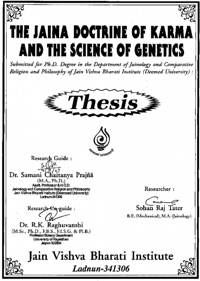According to "The Doctrine of Jaina karma" soul remains in gross body due to existence of karmaśarīra. The person who wants to attain salvation for eternal pleasures does efforts to vanish karmaśarīra. There are many ways to eradicate karmas attached to soul. Udīrṇa, Udvartana, Apvartana and Saṁkramaṇa are the ways to cradicate pre matured karmas. According to Ācārya Mahāprajña "The theory of saṁkramaṇa is the theory of mutation of genes. Gene transplantation, Gene theraphy. Gene finger printing, transplantation of limbs, cloning etc. are the various processes of Gene improvement by Genetic Engineering. So the study of karma and Genetic Engineering is the study of Saṁkramaṇa of karma.
In a short but interesting article, "Religion, genetics and embryo" of Sophie Boukhari, Unesco courier journalist, an array of responses to the bioethical question posed by genetic technologies, by Catholics, Protestents, Buddhist, Muslims and Jews are referred. "Although religious practice may be declining" says French geneticist and member of parliament Jcan Francois Mattei "the metaphysical issue is still at the core of the question raised about Genetic Engineering, either by tradition, culture or duty" should a person has recourse to prenatal screening and consider having on abortion if a serious genetic defect is discovered? Should search on embryos, gene therapy and cloning be allowed? All the "religions of book" (Christianity, Judaism and Islam) believe that the answers to these questions largely depend on the status of embryo. The frontier between "good" and "bad" Genetic Engineering depends on whether or not the embryo is considered to be "animate". "If the ambryo has soul, then it is endowed with a human (with karmaśarīra) as well as biological life and any attack on its integrity is seen as a crime" says French Geneticist Hene Frydman. That is to say that even geneticists and religious books both believe in karmas playing role through genes in this gross body.[76]
Concept of karma resembles the concept of gene in all its functions. Rather the concept of karma goes one step ahead in the sense that apart from transporting the hereditary influences over the twenty four generations of both the parents, it also takes into account the effect of individual performances in the previous births. Probably further studies in the field of Genetic Engineering may break upon a new era in the field of transmigration of soul striving for ultimate state of liberations.
Jaina karma theory helps us to understand the complexities of personality traits of human beings. Jainian approach for modifying human behaviour through the practice of right faith, right knowledge and right conduct is all psychological in nature. Compared modern psychological approach through the application of principles of repression, inhibition, redirection and sublimation. Jainain approach is rather an attempt to overhaul the wholeness of an individual. It involves only psychological approach, a sort of non-drug therapy.
Jaina karma theory seems to be so sophisticated that it appears to have shown the seed of modern Genetic Engineering. Jaina principle of 'saṁkramaṇa' (Ingression) propounds the theory that karmaparamāṇu can be modified through some variations by following the principles of Jaina karma theory. This clearly indicates towards possibility of changes in the genes in modern times. Jaina karma theory had thus paved the way for such transformations in human beings, the ideas of which have led to the development of modern Genetic Engineering.[77]
 Prof. Dr. Sohan Raj Tater
Prof. Dr. Sohan Raj Tater
 Doctoral Thesis, JVBU
Doctoral Thesis, JVBU